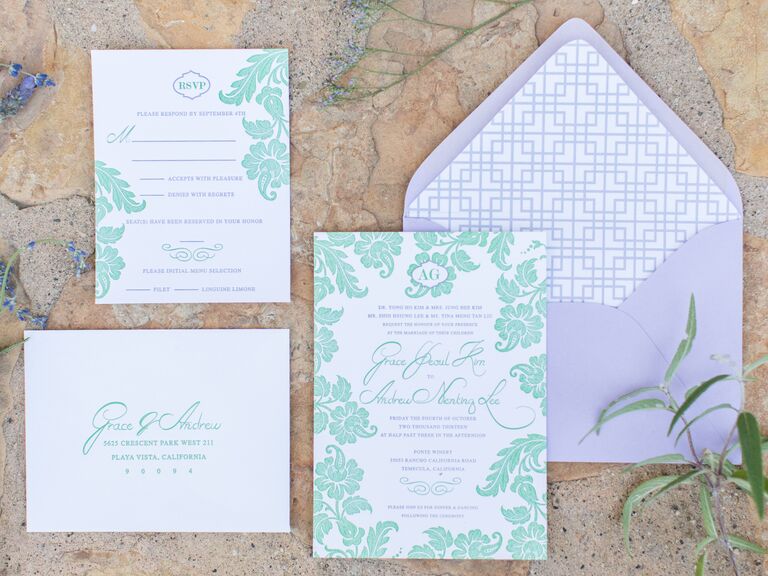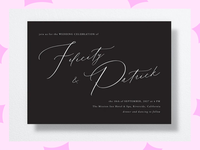Wording Wedding Invitations With Sticky Situations

If you're like many Americans, your familial configuration is anything but nuclear. Parents that are divorced, remarried, or deceased are not uncommon. Likewise, wedding customs have changed: Instead of the bride's family footing the entire bill, more couples are paying for their own festivities, under their own terms. In the wake of these changes, the innocent wedding invitation, where those hosting -- um, paying for -- the wedding are conventionally recognized, has become an etiquette minefield. Read on to escape unscathed with our solutions to sticky wording situations.
Rule 1: Divorced
The basic rule of thumb is to tread lightly -- you don't want to salt old wounds or, if one parent is happily remarried and the other is
un
happily not, bring public attention to this fact, if only to spare the unmarried parent's feelings. Your safest bet is to list your natural parents' names only and on separate lines. If one parent has been remarried for a significant amount of time and that stepparent has played an important role in your life, it is appropriate to include that person's name on the same line as his or her wife or husband. (And regardless of who's remarried, always list the mother first.) If you are faced with two to four sets of remarried parents hosting the wedding, either list each couple on their own line or use the fallback "Together with their families" to keep the invitation uncluttered. Here are some examples.
-
A divorced parent is hosting:
Mr. John Philip Monroe
requests the honor of your presence
at the marriage of his daughter
Elizabeth Ann
to
Kevin Charles Black
son of
Mr. and Mrs. Stanley Black
-
A divorced parent is hosting with new spouse:
Michelle & Timothy Wright
request the pleasure of your company
at the marriage of her daughter
Elizabeth Ann Monroe
to
Kevin Charles Black
son of
Barbara and Stanley Black
-
Divorced parents are jointly hosting:
Mrs. Michelle Wright
and
Mr. John Monroe
request the honor of your presence
at the marriage of their daughter
Elizabeth Ann Monroe
to
Kevin Charles Black
son of
Mr. and Mrs. Stanley Black
Rule 2: Widowed
If the hosting parent is widowed, start with just the surviving parent's name or the surviving parent's new married name and his or her spouse's name. Be sure to specify who is related to the bride. For example:
Michelle and Timothy Wright
request the pleasure of your company
at the marriage of Mrs. Wright's daughter
Elizabeth Ann Monroe
Knot Note: In this example, the daughter's fraternal surname is included to honor the deceased parent.
Rule 3: Ranked
Modern couples today include professional titles on all applicable names. If you choose to do so, keep a couple of things in mind: A title should not be used with Mr., Mrs., or Ms. Also, if you add a title to the bride's name, you should add her last name, as well. Here are the proper titles and usage of common professions:
- Lawyer: Michelle Wright, Esq.
- Doctor: Dr. Michelle Wright
- Judge: The Honorable Michelle Wright
- Clergyperson: The Reverend Michelle Wright (Christian); Father John Monroe (Catholic); Rabbi Michelle Wright (Jewish)
- Military: Captain (Commander or Major) John Monroe
Be sure to properly denote each title in a wedding invitation. For example:
Dr. Michelle Wright and Timothy Wright
and
Mr. John Monroe
request the honor of your presence
at the marriage of their daughter
Elizabeth Ann Monroe
to
Kevin Charles Black, Esq.
son of
Mr. and Mrs. Stanley Black




















